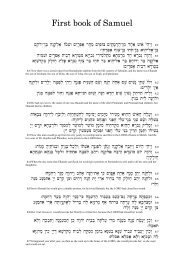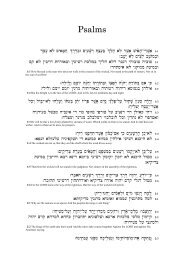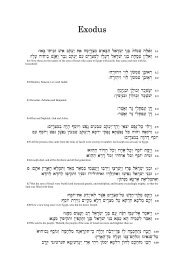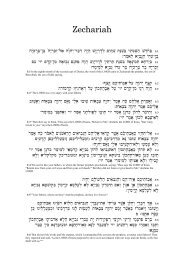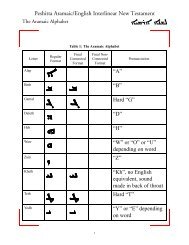Split Words - Peshitta Aramaic/English Interlinear New Testament
Split Words - Peshitta Aramaic/English Interlinear New Testament
Split Words - Peshitta Aramaic/English Interlinear New Testament
Create successful ePaper yourself
Turn your PDF publications into a flip-book with our unique Google optimized e-Paper software.
Now, it just so happens that the <strong>Aramaic</strong> phrase Jwktwbld 0ny9 is an idiom, and as such, can have a literal<br />
translation, and a meaningful translation.<br />
“Many times we have spoken of the Semitic understanding of the heart, that it is the idiomatic organ of<br />
understanding and knowledge.<br />
In Ephesians 1:18, Paul uses this Semiticism:<br />
Jwktwbld 0ny9 (Ayna d'Lebwatkon - "the eye of your hearts")<br />
[The Alexandrian manuscripts (including Tischendorf, Westcott & Hort and Nestle-Aland) tend to literally retain<br />
this <strong>Aramaic</strong> idiom, while the Byzantine texts give a meaningful translation. – Chris]<br />
This clearly demonstrates that Zorba sometimes understood that Paul was using an <strong>Aramaic</strong> idiom, and chose to<br />
liberally translate the meaning into a more acceptable solution in Greek thought.” – Paul Younan<br />
Acknowledgements: Thanks to Paul Younan for providing this split word.<br />
24. Bowels or love? – Philippians 1:8, 2:1 / Colossians 3:12 / Philemon 7, 12, 20 / 1John 3:17 /<br />
2Corinthians 6:12<br />
This example is not really a split word, more of a “pseudo split word”, as the variant in question (at least to my<br />
knowledge) does not occur in the Greek (just about all Greek versions read “bowels”). It does occur though in the<br />
<strong>English</strong> versions. The Byzantine versions tend to say “bowels”, while the Alexandrian versions tend to say “love”.<br />
That the variant is caused by differing translations of an <strong>Aramaic</strong> idiom, is indicative of an <strong>Aramaic</strong> original,<br />
undermining the Greek.<br />
However, this example is quite amazing, as it runs throughout many <strong>New</strong> <strong>Testament</strong> books, and is evidence of<br />
<strong>Aramaic</strong> originality to letters sent to Christians in Greek cities! It also is an example of where an idiom is translated<br />
literally in some versions, and meaningfully in others. This phenomenon occurs in many verses, but for simplicity,<br />
we shall discuss only Philippians 1:8.<br />
The KJV says: “For God is my record, how greatly I long after you all in the bowels of Jesus Christ.”<br />
The NIV says: “God can testify how I long for all of you with the affection of Christ Jesus.”<br />
Versions that say bowels, entrails or a variation thereof: ALT, DARBY, Douay-Rheims, KJV, MKJV, Webster,<br />
Wycliffe, YLT.<br />
Versions that say love, compassion, affection, mercy or a variation thereof: AMP, ASV, BBE, ESV, GodsWord,<br />
Holman, ISV, KJ21, LITV, NASB, NIV, NIV-UK, NKJV, NLT, Rotherham RSV, Weymouth.<br />
Now, it just so happens that the <strong>Aramaic</strong> root Mxr can be meant literally or as part of an idiom.<br />
“CAL Outline Lexicon: GENERAL rxm<br />
rxm N rxm)



